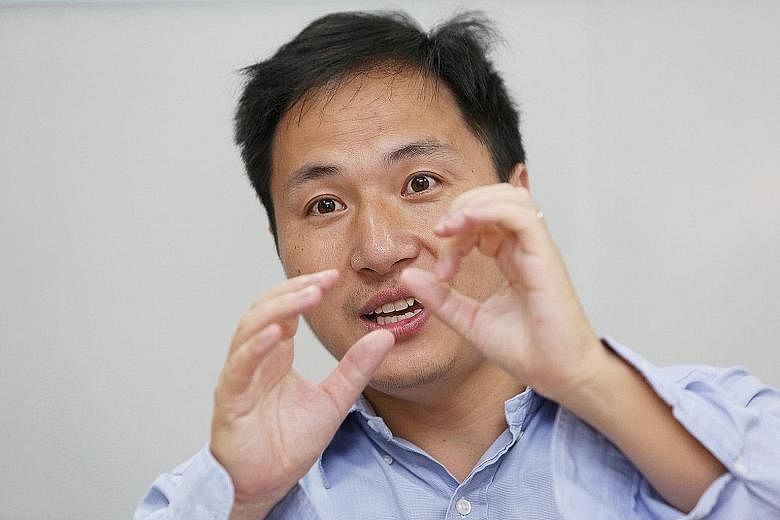BEIJING • China said it has suspended the work of a scientist who claims to have created the world's first genetically edited babies, adding that his conduct appeared to be unethical and in violation of Chinese law.
Dr He Jiankui, announced on Monday that he had used the gene-editing technique Crispr to alter embryos of twin girls, whose father is HIV-positive, to prevent them from contracting the virus. The girls were born last month.
Dr Xu Nanping, China's Vice-Minister of Science and Technology, said Dr He's work was still being investigated. But based on news reports, he said, Dr He appeared to have "blatantly violated China's relevant laws and regulations" and broken "the bottom line of morality and ethics that the academic community adheres to", the state broadcaster China Central Television reported on Thursday.
"It is shocking and unacceptable," Dr Xu was quoted as saying. "We are resolutely opposed to it."
The suspension follows international condemnation from scientists who maintain that Dr He's conduct was unethical. They say there are serious unanswered questions about the safety of embryo editing and a need to make sure that such research is conducted in a transparent, monitored way so the technology is not misused.
Dr Xu had said earlier that Chinese regulations issued in 2003 permitted gene-editing experiments on embryos for research purposes, but only if they remained viable for no more than 14 days.
China's National Health Commission has ordered an investigation into Dr He's experiment.
On Monday, a group of 122 Chinese scientists issued a statement calling Dr He's actions "crazy" and his claims "a huge blow to the global reputation and development of Chinese science".
At an international conference on Wednesday, Dr He asserted that he was proud of what he had done.
He acknowledged he had not made his university in China aware of the research he was doing. He said he initially paid for the research himself, then later from his university funding.
Dr He also pushed back against suggestions that he had been secretive about his work, saying he had presented preliminary aspects of it at conferences and consulted with scientists in the US and elsewhere.
He added that he had submitted his research to a scientific journal for review and had not expected to be presenting it at the conference.
The head of a Chinese Aids support group yesterday expressed deep regret for helping Dr He recruit participants for the experiment.
The founder of the Baihualin (BHL) China League, who calls himself "Bai Hua", reportedly introduced 50 families to Dr He's team.
"I admit that I really regret this incident, and am also very worried about these families and their children," Mr Bai wrote on BHL's blog.
The public outcry over the experiment has drawn attention to the growing HIV/Aids epidemic in China, which has seen a drastic surge in new cases in recent years.
NYTIMES, AGENCE FRANCE-PRESSE

